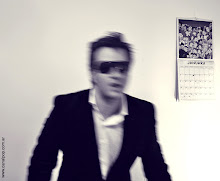From the 70's Movies Fast Rewind
-----------------
Kubrick once said "If Malcolm [McDowell] hadn't been available I probably wouldn't have made the film."
It is said that Stanley Kubrick made this movie because of the failure of "Waterloo" (1970). After he completed 2001: A Space Odyssey (1968), he had planned to film a movie about Napoleon's life. After many years of research, he sent location scouts to various Eastern European locations, and even had an agreement with the army of Yugoslavia to supply troops for the vast battle scenes. However, after Waterloo tanked, Kubrick's financial backers pulled out. He thus decided to adapt the American version of "Clockwork", which had been given to him by Terry Southern (co-writer of Dr. Strangelove or: How I Learned to Stop Worrying and Love the Bomb (1964)).
The writer of the novel, Anthony Burgess, lived for a time in Malaysia [where his wife was beaten by four American GI's, thus giving inspiration to this story]. In Malay, the word "ourang" means man, [this is also part of the derivation of the word 'orangutan', the other half being derived from "houtan" meaning jungle] therefore, the title of the story is actually a pun on the British expression. Rather than a clockwork fruit, it is a clockwork man, which is, of course, exactly what Alex has become by the end of the film.
Before director Stanley Kubrick become involved in the film, Anthony Burgess originally sold the movie to Mick Jagger for $500 when he needed quick cash. Jagger intended to make it with the Rolling Stones as the droogs.
Anthony Burgess absolutely despised Kubrick's movie - particularly because he received no money from it. When Kubrick retreated behind his castle after the movie was hysterically received, Burgess was left to deal with a movie he did not authorize, made from a book he didn't even particularly like. Years later, Burgess wrote a stage version of A Clockwork Orange where the first character to step onto the stage had a remarkable resemblance to Kubrick. The rest of the cast members then proceed to beat the Kubrick-doppelganger.
During the filming of the Ludovico scene, star Malcolm McDowell scratched one of his corneas and was temporarily blinded. He suffered cracked ribs during filming of the humiliation stage show, and he also nearly drowned when his breathing apparatus failed while being held underwater in the trough scene.
When Alex and the droogs enter the Korova Milkbar, there are many paintings on the wall, one of a naked woman. This same painting appears in Shining, The (1980), also directed by Stanley Kubrick.
Alexander's bodyguard was played by professional bodybuilder David Prowse -More famous for another role in '70s Cinema... Darth Vader of "Star Wars" He was apparantly near exhaustion after the repeated takes of him carrying Alexander and his wheelchair down the stairs.
Malcolm McDowell chose to sing "Singin' In The Rain" during the rape scene, because it was the only song he knew all the lyrics to.
The film was not banned in the United Kingdom as many believed. It was withdrawn voluntarily by Kubrick after being criticized as too violent. Kubrick has stated that the film would be released there only after his death. It was. One of the reasons of why Kubrick apparently asked Warner Bros to withdraw the movie on the U.K. was, according to his wife Christiane, several death threats that the family received because of the film.
This was the first film to use the Dolby-A noise reduction system during its theatrical run.
Subscribe to:
Post Comments (Atom)



No comments:
Post a Comment